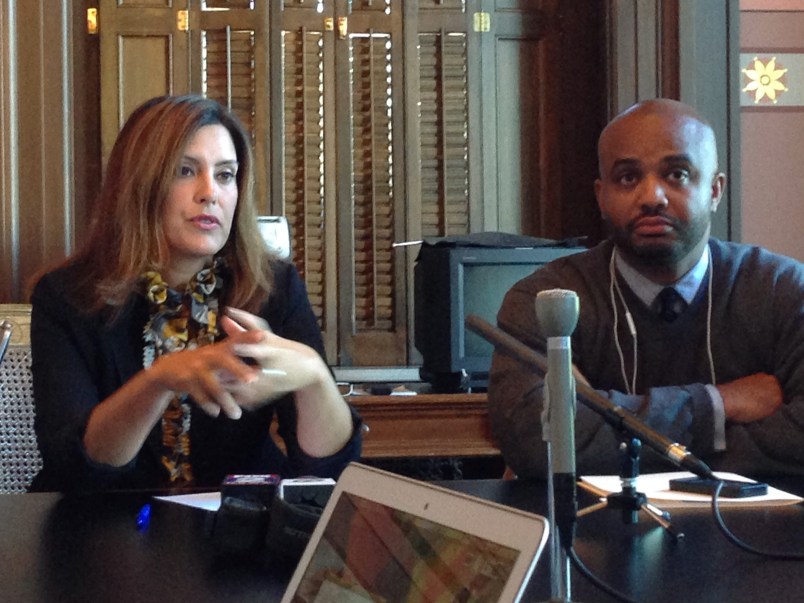Last week, the Michigan legislature passed the “Abortion Insurance Opt-Out Act” which bans private insurance companies from covering abortion services in the state and will force women to purchase additional insurance if they want abortion care to be covered by their health insurance. The bill contains no exception for cases of rape or incest, and you cannot purchase the rider once you are pregnant. It must be purchased prior to a possible pregnancy.
So what does this mean for Michigan? Basically, a woman has to purchase additional insurance on top of her existing insurance in order to have coverage for an abortion before she ever gets pregnant. If a woman is raped and becomes pregnant but has not purchased the separate rider for abortion coverage, she cannot have her health insurance pay for it. Michigan women are now forced to pay more simply because they may possibly become pregnant at some point, no matter the circumstances. Now enshrined in Michigan law is an understanding that women are always pre-pregnant, and it is up to you to pay more simply because you have a uterus.
This kind of provision isn’t new. Michigan has become the 24th state to restrict abortion coverage in private health care plans through the insurance exchanges created under the Affordable Care Act, and Michigan now joins eight other states in outright banning private insurance coverage of abortions (of which only one state allows exceptions for cases of rape or incest). To be clear, these aren’t even public insurance plans like Medicaid that are funded by taxpayer dollars, but are private plans paid for by the beneficiaries. Only 15 states allow Medicaid funding for abortion care, and Michigan wasn’t one of them even before this bill was proposed. According to the Guttmacher Institute, 69 percent of women paid out-of-pocket for abortion care, many of whom had insurance, and 52 percent of those women found it difficult to pay for their own abortions. Michigan’s law will only exacerbate that unfortunate reality.
For the Republican party, which criticized the Affordable Care Act as governmental intrusion into the private sphere, banning private insurance coverage of abortion care seems to be the epitome of hypocrisy. States are now essentially free to dictate which health care services private insurance companies should be allowed to cover and, if you’ve been paying attention for the last three years, it’s no surprise that these laws are often a cover to end coverage for women’s reproductive health care.
But that says it all, doesn’t it? These attacks on abortion rights, whether they are TRAP laws that disguise themselves as protecting women’s safety or misleading fetal pain laws that use junk science to chip away at Roe v. Wade, are at their core about punishing women simply for being women. Laws like this reveal the deep contempt for women and reproductive freedom that underwrites the anti-abortion movement. It isn’t about protecting life; it’s about punishing women.
The lack of an exception for rape or incest has fueled much of the criticism of this bill, with opponents dubbing it “Rape Insurance,” a justifiably harsh but, in all honestly, fairly myopic moniker. Yes, when this law goes into effect in 90 days after Michigan lawmakers adjourn, those who become pregnant from a rape but have not purchased the separate insurance rider for abortion coverage are forced to figure out another way to obtain safe and legal abortion care. No doubt, that is utterly egregious, and opponents are right to highlight how truly despicable that fact is. But those who aren’t raped and need help affording abortion care are just as entitled to it as those who are. As Jessica Valenti noted at The Nation, there is no hierarchy of deserving abortions; abortion is health care, and health care is a human right, one to which we all are entitled, regardless of our circumstances.
Michigan’s newest law is but one of many of the escalating attacks on abortion rights in the last three years, and this law caps what has been a truly devastating year for the right to a safe and legal abortion in the United States. While we technically still have the constitutional right to an abortion in America, many are unable to exercise that right, often due to financial cost. Roe v. Wade is meaningless if pregnant people can’t afford to have a safe and legal abortion.
In such a legislative landscape, one that grows ever harsher to basic reproductive freedom, it is low-income women who are dealt the greatest blow. The wealthy will still be able to access safe and legal abortion care, as they have the economic resources to both pay for the procedure and for potential travel expenses if their state’s laws are particularly restrictive. Low-income women do not have that luxury. The Hyde Amendment has prohibited federal funding of abortion care for low-income women since 1976, and now, even those who make enough to have employer-provided health care or individual plans are watching their rights evaporate in front of their very eyes.
As abortion restrictions pile up and anti-abortion activists grow more brash in their legislative tactics, we are likely to see an upsurge in people turning to unsafe and unregulated methods to terminate their pregnancy, all without a blink of the eye from those who proudly proclaim their commitment to life. Dangerous legislation like Michigan’s “Abortion Insurance Opt-Out Act” not only violates the human rights of pregnant people and reveals the hypocrisy of Republican legislators, it threatens the safety and lives of pregnant Michiganders.
Lauren Rankin is a feminist writer and activist. Her work has appeared at publications such as Salon, RH Reality Check and TruthOut. Currently a graduate student in Women’s and Gender Studies at Rutgers University, she focuses on reproductive politics and the political use of sexual shame. Follow her on twitter at @laurenarankin.






